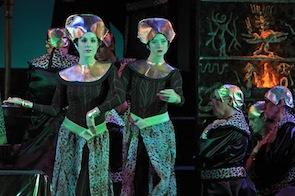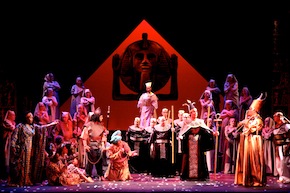
Photos by Otak Jump
Power and pity. Those two words resonate through the decades from Leonard Bernstein's magnificent 1973 Norton Lectures at Harvard. Of all his quirky and insightful presentations in that series, none stayed with me as vividly as his analysis of Stravinsky's Oedipus Rex by way of the Aida-Amneris duet.
If that sounds strange, yes, it is, but take a look to refresh your memory, and, better yet: get the lectures.
As Bernstein played and sang a deep baritone version of the royal slave's desperate plea to the princess who had absolute power over her ("Tu sei felice/tu sei possente/Io vivo solo per questo amor" — You are happy/you are powerful/I live only for this love), besides the illumination of Aida and its relevance to Oedipus Rex, Bernstein also made a major, if unstated, point.
The essence of Aida — and many other spectacular Verdi operas — is not in creating a spectacle (which, of course, is good for business), but in holding up intense human emotions to the light of great music. The elephants, really, are incidental — a good thing because if West Bay Opera got hold of just one small elephant to lead the Triumphal March, there wouldn't have been space for anybody else; cast and chorus would have had to join Allanda Small, the outstanding Voice of the High Priestess, somewhere in the rafters.
So the current pachyderm-free Aida in Palo Alto reverts to the work's essence, and does well by the inner Verdi. Still, Aida is big and West Bay is small.
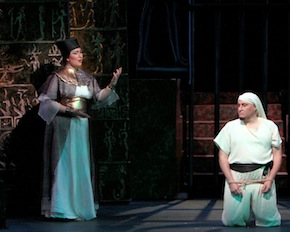
West Bay has been boldly insisting on its reach exceeding its grasp, with a long, distinguished series of small-company productions of big operas. Lucie Stern's postage-stamp sized stage has held Turandot, Samson et Dalila, The Flying Dutchman, and many more. (The 2012-2013 season, announced over the weekend, consists of Offenbach's The Tales of Hoffmann, Donizetti's Lucia di Lammermoor, and another Verdi biggie, Otello.)
Besides a uniformly fine cast, West Bay Opera's Aida offers Yefim Maizel's traffic-management direction (40+ on stage at one time!), Peter Crompton's simple but effective sets of sliding panels decorated with hieroglyphics, Abra Berman's impressive costumes (but not Chad Bonacker's strangely varying lighting — flash on/flash off — calling attention to itself). Credit for doing justice by Verdi goes to the orchestra and guest conductor Michel Singher.
Company General Director José Luis Moscovich appeared before the performance, leaning on a cane and in obvious pain, explaining that a serious back injury prevented him from conducting, and he thanked Singher for coming to the rescue. In asking for continued financial support, Moscovich also made a simple, powerful plea for "opera in our community."
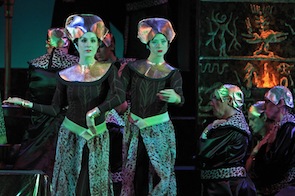
The overture and the beginning of the first act was cautiously slow, and the tempo held back — but did not diminish — David Gustafson's clarion-call "Celeste Aida." Tempi picked up soon thereafter and held steady for the rest of the performance. Seldom have I heard this small orchestra play so consistently well; Bryan Higgins' reduced orchestration worked wonders. Kudos to concertmaster Kristina Anderson for her solos, to the reliable woodwinds, and to the busy brass, which really held up its end.
This is especially commendable as each "section" is comprised of a single player: Rob Lenicheck (trumpet), Michael Cushing (trombone) ... except the twin horns: Alicia Telford and Diane Ryan.
Gustafson's lyric-to-beefy tenor was a joy; Cybele Gourverneur's statuesque Amneris exuded self-confidence and authority. Douglas Botnick is an impressive, sonorous Amonasro; Carlos Aguilar's King and Isaiah Musik-Ayala's Ramfis fit in well.
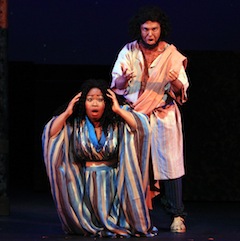
In the title role, Merola/Adler veteran Karen Slack sang so powerfully that she could have well filled a theater twice the size of Lucie Stern. Her big, accurate voice sometimes lacked in warmth and variety, and she needs to put more believable emotion into her acting.
The women of chorus master Carl Pantle's massed (if small) forces sang very well, especially in the scenes where they were exposed to the audience at close range — no hiding there. Among the men, unfortunately, a few raw voices stuck out repeatedly: They could have used some masking.
West Bay's ambitious production offered something even major opera houses often neglect: all three ballets, choreographed by Yannis Adoniou and well performed by willowy Kunst Stoff dancers Lindsey Renee Derry, Katie Gaydos, Risa Larsen, and Daiane Lopes DaSilva.

